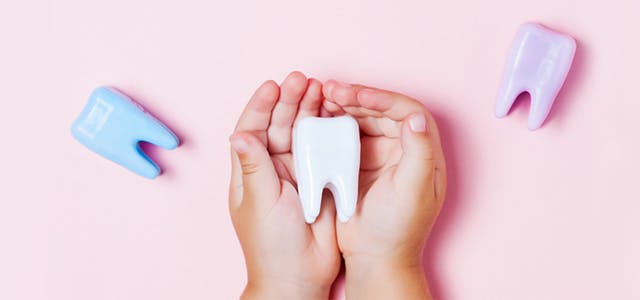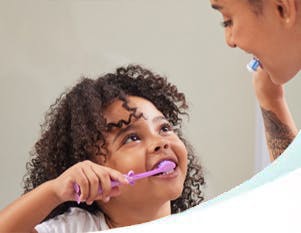What to Do When a Child’s Tooth Is Loose
If your little one bites into an apple and notices a wiggly tooth, you might be curious how to respond. While loosing baby teeth is a normal part of growing up, proper oral hygiene can help the process go smoothly.1 Read on to learn how to take care of your child’s loose tooth and when baby teeth typically fall out.
Key Takeaways
- Let loose teeth fall out naturally: Avoid pulling baby teeth too early—natural loss helps adult teeth grow in correctly.1
- Loose teeth are part of normal development: Kids usually start losing teeth around age five or six, with most baby teeth gone by age twelve.1,2
- See a dentist after injuries: If a tooth becomes loose from a fall or bump, it’s best to get it checked to rule out serious damage.4
Should You Pull Out Your Child’s Loose Tooth?
If your child has a loose tooth, it’s better to leave it and let it fall out naturally.1 Baby teeth are designed to guide permanent (adult) teeth into the correct position in the mouth.1 Removing your child’s loose tooth too early could cause the adult tooth to grow in crooked and lead to other dental issues later on.1
Why Is My Child’s Tooth Loose?
For children, having loose teeth is a normal part of growing up and shouldn’t cause tooth pain.1 Wiggly teeth occur when a child’s baby tooth starts to loosen due to pressure from their incoming adult tooth breaking through the gum line.1 Your little one will know they have a loose tooth when they feel it with their tongue or finger.1
What to Do Once Your Kid’s Loose Tooth Is Out
Once your child is holding their previously loose tooth in their hand, let them know that losing a tooth is a natural part of growing up and a developmental milestone for them.1
In fact, research published in the International Journal of Paediatric Dentistry found that for most children, losing the first primary tooth is associated with positive emotions.2 Only around 22 percent of children reportedly experienced negative emotions such as fear or being scared.2 So celebrate the loss of a baby tooth and arrange for the Tooth Fairy to pay a visit!
When Do Children’s Teeth Fall Out?
Baby teeth typically start to fall out around age five or six.3 By the time they’re eight, most children will have their top four and bottom four permanent teeth, as well as their molars, also known as their “six-year molars.”3 At around age ten, your child’s canines will start coming loose.3 Lastly, your kid’s final baby teeth usually fall out around age 12 and their wisdom teeth start coming in during their teenage years.3
What If Your Child’s Tooth Is Loose from an Injury?
If your kid runs into something, falls, or bumps their mouth, they might experience a prematurely loose tooth.4 In this case, their teeth can generally tighten again over time with a soft diet and proper oral care.4 However, even if the injury appears to be minimal, you get their tooth checked by a dentist to see if there are larger issues that need to be diagnosed.4
For more moderate tooth injuries, like if your child’s tooth is loose due to being knocked out of position, keep their tooth comfortable and clean and take them to the dentist.4
Taking Care of All Those Teeth
As far as the rest of your child’s teeth go, make sure that your little one is brushing their pearly whites for two minutes, two times a day with a fluoride toothpaste.5 For 24-hour cavity protection* that’s gentle on your child’s enamel, try Pronamel Kids.
*Follow a healthy diet and brush twice daily (Level of protection may decrease between brushings)
Source Citations:
- Loose Tooth: Causes & What To Do. Cleveland Clinic. https://my.clevelandclinic.org/health/diseases/loose-tooth. Accessed 5/2/25.
- Emotions experienced during the shedding of the first primary tooth. International journal of pediatric dentistry. https://pubmed.ncbi.nlm.nih.gov/30218480/. Accessed 5/2/25.
- When will my child’s baby teeth fall out? St. Louis Children's Hospital. https://www.stlouischildrens.org/health-resources/pulse/baby-teeth. Accessed 5/2/25.
- What to Do When Your Child Chips or Knocks Out a Tooth. University of Utah Health. https://healthcare.utah.edu/the-scope/health-library/all/2019/06/what-do-when-your-child-chips-or-knocks-out-tooth. Accessed 5/2/25.
- Baby Teeth. MouthHealthy. Oral Health Information from the ADA. https://www.mouthhealthy.org/all-topics-a-z/baby-teeth. Accessed 5/2/25.





